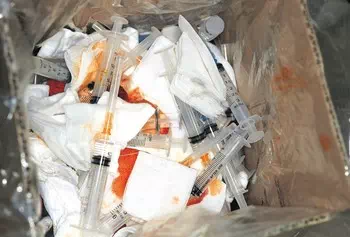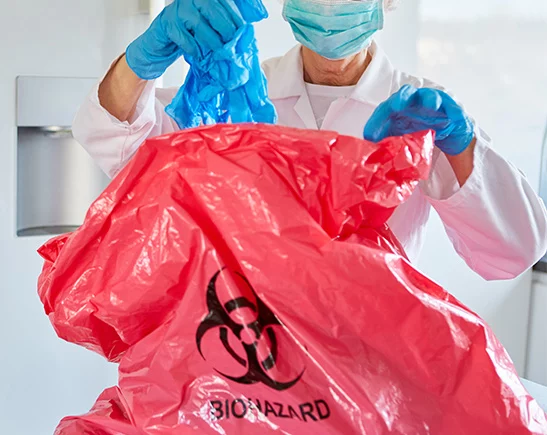Safe and Secure: The Definitive Choice for Professional Medical Waste Removal Solutions
Safe and Secure: The Definitive Choice for Professional Medical Waste Removal Solutions
Blog Article
Exploring Different Garbage Disposal Options for a Cleaner Setting
In the pursuit of a cleaner atmosphere, the administration of waste disposal has emerged as an essential focal factor for sustainable development. With a multitude of waste disposal alternatives readily available, varying from standard land fill techniques to ingenious waste-to-energy modern technologies, the option of exactly how we manage our waste has significant ramifications for our earth's well-being.
Recycling Techniques
Implementing effective reusing methods is vital in minimizing waste and advertising sustainability in our environment. Recycling involves the procedure of converting waste products into multiple-use items to protect against unnecessary disposal.
One more important recycling technique is composting, which entails disintegrating organic waste like food scraps and backyard trimmings into nutrient-rich soil. This procedure not just diverts organic waste from landfills yet likewise generates a useful resource for gardening and farming. Furthermore, upcycling is an innovative recycling approach that includes transforming old or thrown out products into products of higher quality or worth. By integrating these various recycling approaches right into our waste monitoring methods, we can significantly decrease our environmental impact and relocate in the direction of an extra lasting future.

Composting Methods
Efficient waste administration techniques, such as recycling approaches, pave the method for a cleaner setting, and now, shifting the emphasis to 'Composting Techniques', we discover sustainable methods to decompose organic waste for ecological advantage. medical waste removal service.
Composting is an all-natural procedure that transforms organic waste, like food scraps and lawn trimmings, right into a nutrient-rich soil modification. The secret to successful composting hinges on producing the right balance of green materials, such as fruit and veggie scraps, and brownish materials, like dried twigs and fallen leaves. These products decompose with the help of microorganisms, breaking down the waste into important garden compost.
There are various composting techniques offered to fit different demands. Conventional backyard composting includes layering organic materials in a container or pile and routinely transforming the mixture to aerate it. Vermicomposting, on the various other hand, uses worms to damage down organic issue right into compost (click here). For those with restricted space, indoor composting systems offer a practical solution. By using composting techniques, we can lower the quantity of waste sent out to landfills while creating a useful product for enhancing soil and supporting plant growth.
Incineration Cons and pros
Incineration, as a waste disposal technique, provides both advantages and downsides that warrant cautious factor to consider in the world of lasting waste monitoring practices. On the silver lining, incineration can significantly minimize the quantity of waste, decreasing the demand for land fill space and possibly lowering greenhouse gas exhausts. Incineration additionally permits for the recuperation of power via the generation of electricity or warmth, adding to resource recuperation. The procedure can be used to destroy harmful substances, using a risk-free approach for dealing with specific kinds of waste that may posture dangers to public wellness and the atmosphere if left unattended.
Nevertheless, there are noteworthy drawbacks to incineration. One significant worry is the potential launch of unsafe pollutants into the air, such as dioxins, hefty steels, and particulate matter, which can have damaging impacts on human wellness and the environment. In addition, the high initial investment and functional costs of incineration facilities posture economic challenges, making it a much less cost-effective alternative compared to other waste management approaches. Cautious monitoring and policy are vital to mitigate these negative influences and optimize the advantages of incineration as part of a thorough waste administration technique.
Land Fill Monitoring Approaches
Land fills play an essential role in waste management and environmental conservation by offering a containment system for the disposal of solid waste materials. Effective landfill management techniques are necessary to mitigate environmental effects and make certain the lasting sustainability of these waste disposal websites. One crucial strategy appertains waste compaction to optimize making use of offered space within the landfill (click here). By compacting the waste, the volume is lowered, enabling even more waste to be suited gradually.
Moreover, the implementation of everyday cover techniques is vital in lessening smells, avoiding trash, and decreasing the tourist attraction of bugs. Covering the disposed waste at the end of each day aids to have smells and prevent potential ecological contamination. Furthermore, the surveillance of land fill gas discharges and leachate levels is vital in making certain that ecological criteria are fulfilled which any kind of possible threats to surrounding ecological communities are minimized.

Waste-to-Energy Technologies
One of the innovative methods to lose monitoring entails utilizing Waste-to-Energy modern technologies to convert solid waste into functional power sources. Waste-to-Energy (WtE) modern technologies incorporate a series of processes that aim to extract energy from waste products with thermal, chemical, or organic means. This conversion procedure not just lowers the volume of waste that ends up in land fills yet additionally generates useful energy resources such as electrical energy, warm, or biofuels.
There are several approaches of Waste-to-Energy conversion, including pyrolysis, incineration, and gasification. Incineration entails shedding waste at heats to create warmth and power. Gasification converts waste right into a syngas, which can be made use of for power generation or chemical manufacturing. Pyrolysis breaks down natural products making use of high temperature levels in the absence of oxygen, creating bio-oil, gas, and char.
Executing Waste-to-Energy innovations can aid minimize environmental issues related to standard garbage disposal techniques while all at once giving a renewable resource resource. Careful consideration has to be given to exhausts control and guaranteeing the sustainability of feedstock supplies for these modern technologies to be really helpful for a cleaner atmosphere.

Conclusion
Finally, exploring different garbage disposal options such as recycling, composting, incineration, landfill administration, and waste-to-energy innovations is important for promoting a cleaner setting - click here. Each technique has its own advantages and obstacles, however by making use of a mix of these strategies, we can function towards decreasing the quantity of waste that winds up in garbage dumps and eventually add to a much more sustainable future for generations to find
With a wide range of waste disposal choices readily available, ranging from traditional landfill techniques to cutting-edge waste-to-energy technologies, the selection of just how we additional hints manage our waste has far-ranging ramifications for our world's well-being. medical waste disposal.Incineration, as a waste disposal method, offers both benefits and disadvantages that merit mindful consideration in the world of sustainable waste monitoring techniques.Landfills play a vital duty in waste management and ecological conservation by offering a containment system for the disposal of solid waste products. By compacting the waste, the quantity is reduced, enabling for even more waste to be suited over time
One of the innovative approaches to throw away management includes harnessing Waste-to-Energy modern technologies to transform strong waste into usable power sources.
Report this page